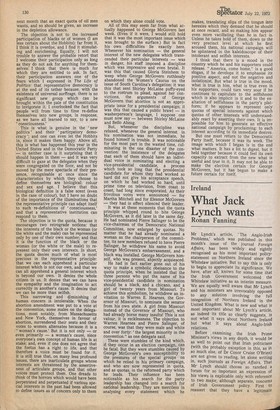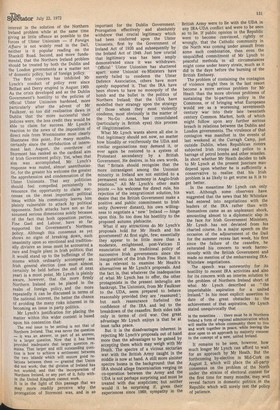Ireland
What Jack Lynch wants
Ronan Fanning
Mr Lynch's article, 'The Anglo-Irish Problems,' which was published in this month's issue of the journal Foreign Affairs, has been widely and rightly recognised as his most important policystatement on Northern Ireland since the Whitelaw initiative. But to say this is only to begin to appreciate its significance. We have, after all, known for some time that the Irish Government welcomed the Whitelaw initiative as an interim measure. We are equally well aware that Mr Lynch and his ministers are irrevocably opposed to any solution involving the full integration of Northern Ireland in the United Kingdom. What is new and what is most important about Mr Lynch's article, as indeed its title so clearly suggests, is not what it says about Northern Ireland but what it says about Anglo-Irish relations.
Before examining the Irish Prime Minister's views in any depth, it would be as well to point out that Irish politicians (with the probably exception in this, as in so much else, of Dr Conor Cruise O'Brien) are not given to reading, let alone writing in, such journals as Foreign Affairs. That Mr Lynch should choose so rarefied a forum for so important an expression of his views is explicable only with reference to two major, although separate, concerns of Irish Government policy. First to reassert that they have a legitimate interest in the solution of the Northern Ireland problem while at the same time giving as little offence as possible to the forces of Ulster Unionism — if Foreign Affairs is not widely read in the Dail, neither is it popular reading on the Shankill Road. Second, and more fundamental, that the Northern Ireland problem should be treated by both the Dublin and the London governments as a matter not of domestic policy, but of foreign policy.
The first concern has inhibited Mr Lynch's conduct of policy ever since Belfast and Derry erupted in August 1969. As the crisis developed and as the Dublin Government's hostility to the policies of official Ulster Unionism hardened, more particularly after the advent of Mr Faulkner, so too did realisation dawn in Dublin that the more successful their policies were, the less credit they would be able to claim for success. Mr Lynch's reaction to the news of the imposition of direct rule from Westminster most clearly illustrates this point. For many months, certainly since the intrbduction of internment last August, the overthrow of Stormont has ranked as the cardinal aim of Irish Government policy. Yet, when that aim was accomplished, Mr Lynch's response was muted, almost unenthusiastic, for the greater his welcome the greater the apprehension and condemnation of the Ulster Unionists. That any politician should feel compelled persistently to renounce the opportunity to claim successes on the most important political issue within his community leaves him plainly vulnerable to attack by political opponents. Such attacks have not so far assumed serious dimensions solely because of the fact that both opposition parties, Fine Gael and Labour, have so far supported the Government's Northern policy. Although this consensus as yet shows no signs of breaking down, such unanimity upon so emotional and traditionally divisive an issue must be accounted a rare and fragile plant in Irish politics; that it would stand up to the buffetings of the storms which ordinarily accompany an Irish general election (one must almost certainly be held before the end of next year) is a moot point. Mr Lynch is plainly aware, however, that the more firmly Northern Ireland can be placed in the realm of foreign policy, and the more repeatedly it can be discussed in terms of the national interest, the better the chance of avoiding the many risks inherent in its becoming an issue in party politics.
Mr Lynch's justification for placing the matter within this wider context is based Upon his contention that: The real issue to be settled is not that of Northern Ireland. That was never the question — it was an answer, or part of an answer, to a larger question. Now that it has been Provided inadequate that larger question remains. That larger and still outstanding question is how to achieve a settlement between the two, islands which will ensure good relations between them — granted that Union did not work; that the division of Ireland has not worked; and that the incorporation of Northern Ireland, or any part of it, fully within the United Kingdom cannot work. It is in the light of this passage that we may more readily perceive why the prorogation of Stormont was, and is so important for the Dublin Government. Prorogation effectively and absolutely withdrew that crucial legitimacy which had been conferred upon the Ulster Unionists, first by the Government of Ireland Act of 1920 and subsequently by the Ireland Act of 1949. Just how crucial that legitimacy was has been amply demonstrated since it was withdrawn. ' Official ' Ulster Unionism has shattered apart: some Unionist ex-Ministers have merely failed to condemn the Ulster Defence Association, others have more openly supported it. That the IRA have been shown to have no monopoly of the bomb and the bullet in the politics of Northern Ireland; that the UDA have modelled their strategy upon the strategy of those whom they most violently condemn, most obviously in the matter of the No-Go Areas, has consolidated (particularly in British eyes) this process of illegitimisation.
What Mr Lynch wants above all else is that legitimacy should not now, no matter how bloodily or vociferously the UDA and similar organisations may demand it, or ever again be restored to a system of Protestant ascendancy by a British Government. He desires, in his own words, that " Britain should recognise that the more intransigent among the Unionist minority in Ireland are not entitled to a permanent veto on harmony in Anglo-Irish relations." All Mr Lynch's other main points — his welcome for direct rule, his rejection of the integrationist solution, his desire that the British Government make a positive and public commitment to Irish unity (however distant), his own willingness to negotiate a ' new' Ireland — hinge upon this. So too does his hostility to the proposed autumn plebiscite.
What if any attractions do Mr Lynch's proposals hold for Mr Heath and his government? At first sight, few; essentially they appear to be little more than a moderate, enlightened, post-Vatican II enunciation of the traditional policy of successive Irish governments since the inauguration of the Irish Free State. But it is as relevant to examine Mr Heath's alternatives as Mr Lynch's proposals. And the fact is, that whatever the inadequacies of what Mr Lynch has to offer, the other protagonists in the present imbroglio are bankrupt. The Unionists, from Mr Faulkner to the UDA, seem prepared to behave reasonably provided they are reassured '; but such reassurance forfeited the confidence of the IRA and led to the breakdown of the ceasefire. Both sides talk only in terms of civil war. One great advantage Mr Lynch enjoys is that he at least talks peace.
But it is the disadvantages inherent in rejecting Mr Lynch's proposals out of hand more than the advantages to be gained by accepting them which may weigh with Mr Heath. The spectre of a vicious sectarian war with the British Army caught in the middle is now at hand. A still more sinister spectre looms in the background: that the IRA should allege fraternisation verging on co-operation between the Army and the UDA is not perhaps surprising and must be treated with due scepticism; but neither would it be surprising if, given their experiences since 1969, sympathy in the British Army were to lie with the UDA in any IRA-UDA conflict and were to be seen so to lie. If public opinion in the Republic were to become convinced, rightly or wrongly, that the Catholic community in the North was coming under assault from some such combination, then even the unqualified commitment of Mr Lynch to peaceful methods in all circumstances might come under heavy strain, much as it did in the days before the burning of the British Embassy.
The problem of containing the contagion of violence might then in the last resort become a more serious problem for Mr Heath than the more obvious problems of sustaining the bi-partisan policy in the Commons, or of bringing what Europeans would see as a worsening seventeenth century war into their late twentieth century Common Market, both of which might follow upon any further serious breach in relations between the Dublin and London governments. The virulence of that contagion was manifest in the events of last weekend at the Curragh Camp, just outside Dublin, when Republican rioters subjected Irish troops and police to a barrage of petrol bombs and other missiles.
In short whether Mr Heath decides to talk
to Mr Lynch at the present juncture may depend upon whether •he is sufficiently a
conservative to realise that his Irish problem is as likely to get worse as it is to get better.
In the meantime Mr Lynch can only wait. Although some observers have suggested that the news that Mr Whitelaw had entered into negotiations with the leaders of the IRA rather than with themselves came as an unpleasant shock, amounting almost to a diplomatic slap in the face for Irish Government Ministers, Mr Lynch has not deviated from his charted course. In a major speech on the occasion of the adjournment of the Dail for the summer recess last week, his first since the failure of the ceasefire, he reiterated his concern to work harmoniously with the British Government and made no mention of the embarrassing IRAWhitelaw negotiations.
The speech was noteworthy for its hostility to recent IRA activities and also for its concern with an interim solution to the problem of Northern Ireland short of what Mr Lynch described as "the imperishable aspiration for a united Ireland." In his most explicit assertion to date of the great obstacles to the achievement of that aspiration, Mr Lynch stated unequivocally that
in the meantime . . . there must be in Northern Ireland a form of regional administration which will enable the whole community there to live and work together in peace, while leaving the door open to an approach by majority consent to the concept of a new, united Ireland.
It remains to be seen, however, how much longer Mr Lynch can afford to wait for an approach by Mr Heath. But the forthcoming by-election in Mid-Cork on August 2, which will place the all-party consensus on the problem of the North under the strains of electoral contest for the first time for many months, may well reveal factors in domestic politics in the Republic which will sorely test the policy of patience.











































 Previous page
Previous page